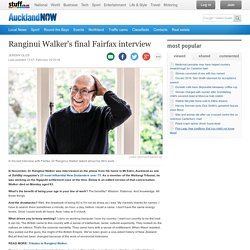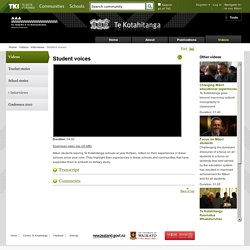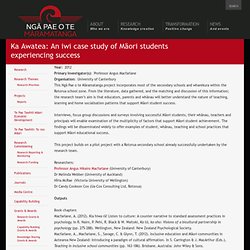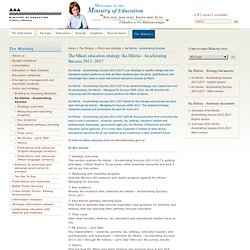

Wally penetito herbison2011. EDtalks. Tau Mai Te Reo – The Māori Language in Education Strategy 2013-2017. Ranginui Walker's final Fairfax interview. Last updated 13:47, February 29 2016 In his last interview with Fairfax, Dr Ranginui Walker talked about his life's work.

In November, Dr Ranginui Walker was interviewed on the phone from his home in Mt Eden, Auckland as one of Sunday magazine's 25 most influential New Zealanders over 75. As a member of the Waitangi Tribunal, he was working on the Ngapuhi settlement case at the time. Below is an edited version of that conversation. Walker died on Monday aged 83. What's the benefit of being your age in your line of work?
And the drawbacks? What drives you to keep working? READ MORE: Tributes to Ranginui Walker There's a whole lot of revisionist historians who are putting out the correct version of history, and the Waitangi Tribunal is adding to that work. Have things really improved for Maori? Were you an ambitious child? It was inherent in my nature to do the best I could, to work hard. Have your thoughts about colonisation changed as you've gotten older? Teaching is a very important job. Colouring in the White Spaces: Reclaiming Cultural Identity in Whitestream Schools.
Student voices / Interviews / Videos / Te Kotahitanga - Home - Te Kotahitanga. Transcript “When you’re a Māori student, as sad as it sounds, the expectations for you to fail are very high, so I think those are the kind of expectations we wanted to push away.”

“Oh when I first arrived here my goal was to pretty much just to have fun and just eat my lunch I guess, so that was fourth form when I arrived. And then fifth form started, my maths was started dropping out of school and then I just started realizing it’s getting a bit serious now.” “Level 1 was like a hard year for me, I was just didn’t care anymore, it was just like, ‘Oh school, I want to drop out.’” “There was only one teacher that actually taught me and that was my English teacher and all my other teachers just thought I was naughty as and sort of excluded me from everyone else. “Some teachers they teach to the whole class, they don’t look at the individuals, so it’s kind of easier when they look to you as a person and then see what help you need, like not as a class because everyone’s different.”
Home - Ako Panuku, Maori teacher, Professional development planning. Ka Awatea: An iwi case study of Māori students experiencing success. Primary Investigator(s): Professor Angus Macfarlane Organisation: University of Canterbury This Ngā Pae o te Māramatanga project incorporates most of the secondary schools and wharekura within the Rotorua school zone.

From the literature, data gathered, and the matching and discussion of this information; the research team’s aim is that educators, parents and whānau will better understand the nature of teaching, learning and home socialisation patterns that support Māori student success. Interviews, focus group discussions and surveys involving successful Māori students, their whānau, teachers and principals will enable examination of the multiplicity of factors that support Māori student achievement. This project builds on a pilot project with a Rotorua secondary school already successfully undertaken by the research team. Outputs Book chapters Macfarlane, A. (2012). Conference Presentations Macfarlane, A. (2014). Wairua. The Māori education strategy: Ka Hikitia - Accelerating Success 2013 -2017. Ka Hikitia – Accelerating Success 2013–2017 is our strategy to rapidly change how the education system performs so that all Māori students gain the skills, qualifications and knowledge they need to enjoy and achieve education success as Māori.

Ka Hikitia – Accelerating Success 2013–2017 is an updated strategy, not a brand new one. Its predecessor, Ka Hikitia – Managing for Success 2008–2012, set the direction for improving how the education system performs for Māori students. Ka Hikitia – Accelerating Success 2013–2017 builds on the changes and success we have seen through Ka Hikitia – Managing for Success 2008–2012.
This renewed strategy celebrates success and accelerates the pace for more of it. Tataiako (Click on page when loaded) Multiple literacies: Cheryl Stephens. Using Maori Pedagogies.